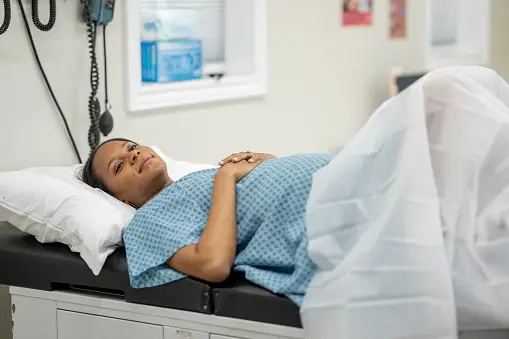IVF (in vitro fertilisation) is a medical procedure that involves combining an egg and sperm in a lab dish outside of the body. This technology for assisted reproduction is frequently used when natural conception proves difficult.
This procedure entails inducing numerous eggs from the ovaries, extracting the eggs, fertilizing them with sperm in a lab, and then putting the resultant embryos into the uterus.
IVF is used to treat infertility caused by a variety of conditions, including endometriosis, male infertility, fallopian tube disorders, and inexplicable fertility challenges.
Factors to consider when choosing an IVF clinic in Nigeria
- Examine the clinic: This is very important as you would want to know the clinic's success rates, paying particular attention to pregnancy and live birth rates.
- Background of the clinic: You must consider the clinic’s background in IVF treatments. There’s a greater chance of receiving high-quality care from a reputable facility with knowledgeable reproductive doctors.
- General evaluation of the clinic: Check out the clinic's laboratory equipment, technology, and infrastructure. You might attain better results in facilities with modern and well-equipped equipment.
- Accreditation of the clinic: You must also verify the clinic’s accreditation with the appropriate health authorities.
- Testimonials and reviews: Go through their patients' testimonies and reviews. Positive comments may indicate a patient's contentment and general clinic performance.
- Counseling and emotional support: Find out if the clinic provides emotional assistance through counseling during treatment.
- Location of the clinic: Consider the clinic’s location concerning your home. Being reachable can be important, particularly when multiple visits are required during the IVF procedure.
- Ethical guidelines: Verify if the clinic provides reproductive treatments following the law and ethical guidelines.
Which age is best for an IVF?
The best time to undergo in vitro fertilisation (IVF) is in your 20s or early 30s. This age range is frequently advised for the following reasons:
In general, younger women produce more eggs of higher quality. During the IVF process, this is essential for successful fertilisation and the growth of healthy embryos.
Younger women typically have a higher ovarian reserve or the quantity of eggs still in their ovaries.
The probability of getting sufficient eggs during ovarian stimulation is higher in women with a larger ovarian reserve. Younger women usually respond better and produce more eggs for fertilization.
What to expect from an IVF procedure
The following provides a thorough rundown of what to anticipate at each stage of an in vitro fertilisation (IVF) procedure:
Before the IVF process:
- Primary discussion: An initial consultation with a fertility specialist will occur. Discussions are held regarding medical history, fertility evaluations, and possible reasons for infertility.
- Testing for fertility: The lab technicians will perform fertility tests for both you and your partner, including hormone evaluations, analyses of your partner’s semen, and assessments of your ovarian reserve.
- Protocol for ovarian stimulation: You might have to undergo ovarian stimulation to induce your ovaries to produce multiple eggs.
- Monitoring: To monitor the growth of ovarian follicles, you might carry out regular blood tests and ultrasound scans.
- Switch action: A trigger shot is given to the mature eggs to accelerate their final maturation and prepare them for retrieval.
During the IVF Process:
- Retrieval of eggs: Transvaginal ultrasound-guided egg retrieval is a minimally invasive procedure used to extract eggs from the ovaries.
- Collection of sperm: Your partner donates a sample of sperm on the same day as egg retrieval.
- Fertilisation: The fertilization process involves combining sperm and eggs in a lab setting. The development of the fertilised eggs, which are now embryos, is observed.
- The cultivation of embryos: The embryos are cultivated for a few days in the lab, and the healthiest embryos are chosen for transfer.
After the IVF Process:
- Transfer of embryos: You will receive a transfer of one or more chosen embryos into your uterus. This is a painless process.
- Waiting time: An embryo transfer is followed by a waiting period to enable possible implantation.
- Contraception test: To ascertain whether the IVF process produced a pregnancy, a blood test is performed. Usually, this is carried out 10–14 days after embryo transfer.
- Monitoring pregnancy: If the pregnancy test is positive, routine check-ups and ultrasounds will be arranged to monitor the health and development of your pregnancy.
- Potential transfer of frozen embryos (FET): More embryos produced but not used in the first round of a frozen embryo transfer (FET) cycle may be frozen and used later.
Are there side effects to IVF?
Yes, in vitro fertilisation (IVF) may have potential side effects. Mood swings, bloating, pelvic pain, and breast tenderness are typical side effects.
There’s also ovarian hyperstimulation syndrome (OHSS) and multiple pregnancies (an increased risk with multiple embryo transfers). Before undergoing IVF, it’s crucial to speak with your doctor.
Frequently Asked Questions (FAQs)
- How many eggs can I use for an IVF?
The eggs used in an IVF procedure can vary, but multiple eggs are retrieved to increase the chances of successful fertilisation and embryo development.
- Can I give birth to twins with IVF?
Yes, it is possible to give birth to twins or even higher-order multiples with IVF.
- Can I conceive naturally after an IVF?
Most women conceive naturally after their first child with IVF.










Comments